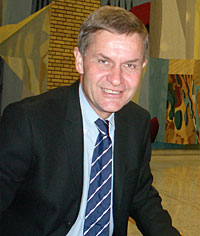Norway's Minister of Environment and International Development, Erik Solheim, spoke to the Nepali Times on Wednesday in Oslo about the political deadlock in Nepal, Norwegian development aid and the negotiations leading up to the international climate conference in Copehagen next month.
Nepali Times: I understand you have been speaking to Nepali leaders on the phone from here. What is your assessment of the situation in Nepal from these conversations? 
Erik Solheim: I have spoken to Prime Minister Nepal, former Prime Minister Prachanda and UML leader Jhalanath Khanal, and Mr Koirala has also agreed to speak to me but there are some practical difficulties. They have all given the impression that they want to continue the reconciliation process and they want to find a solution to the problem, but of course they indicate different ways out of the problem. They have all asked Norway and the international community to do what they can to help. We of course stand ready to do that, but there are no specific ideas about what it is we can do at present.
But don't you tell them this is something they should sort out themselves?
Indeed, and that has been the beauty of Nepal's peace and reconciliation process over the last few years. At every crossroads, in the end you have found solutions yourselves without any substantial foreign interference, and that has been very positive. It seems, however, that some of the momentum has been drawn out of the process over the past year and it is important to come back to that spirit of finding a homegrown solution.
Are you worried by the continued use of violence by the political forces?
You have to expect this to take some time but it should be made very very clear that every form of political violence should be stopped. There must be no compromise on that idea. The YCL as well as the youth groups affiliated with other parties should stop using violence. And of course, the Nepal Army should be a completely depoliticised defender of the Nepali state.
What future do you see for UNMIN?
I think UNMIN played a very crucial role over a long period of time. This kind of international presence is always very helpful, in this instance with the demobilisation of the Maoist fighters. The usefulness and future of UNMIN is up to the Nepalis to decide for themselves.
Are you satisfied with the track record of Norwegian aid in Nepal?
Basically our engagement on development issues is unconnected with the government of the day, we cooperated closely with the Maoist-dominated government at a time when Prachanda was prime minister, and of course now with the Madhav Nepal government. As long as they are in power through a democratic process, whoever is in government can reckon with Norway as a development partner. A key area where we want to increase our involvement is in the hydro sector. Norfund has lined up with India's Tata group in a partnership to boost investment in hydropower. We also stand ready to find ways to support the peace process, through small amounts of money, or Norway can offer its embassy. But in principle it should be a Nepali-driven process.
You've just returned from Copenhagen. The negotiations seem to be stuck.
I am fairly optimistic we will get a political agreement in Copenhagen that will be followed by a legally binding agreement later in 2010. All the main players: the US, China, India, the EU, all want an agreement. But a lot more needs to be done. Nepal is very vulnerable to climate change as your big rivers and glaciers will be affected by melting snows, and this can be an area of future cooperation between Nepal and Norway. I have agreed to meet with Prime Minister Nepal in Copenhagen next month. Your environment minister has also indicated an interest in coming to Oslo, and he is most welcome. I myself should be in Nepal early next year to catch up on climate change issues, but also to talk to the main players in the peace process.
Your program to help forestry worldwide through the REDD (Reducing Emissions from Deforestation and Degradation) mechanism doesn't yet recognise and reward the contribution of Nepal's successful community forestry program. Any plans?
I am absolutely ready to talk about that. The main focus of the REDD program has been the protection, conservation and sustainable use of rainforests because those are the most important from the viewpoint of biodiversity and climate change, but we can expand it to 'REDD Plus' to include other aspects like community forestry. We are absolutely interested in discussing this.
READ ALSO:
Norwegian guru, From East-West with Kunda Dixit, NOV 19, 2009
Technology deficit, From Issue #471 (09 OCT 2009 - 15 OCT 2009)
Copenhagen climate countdown, From Issue #472 (16 OCT 2009 - 22 OCT 2009


